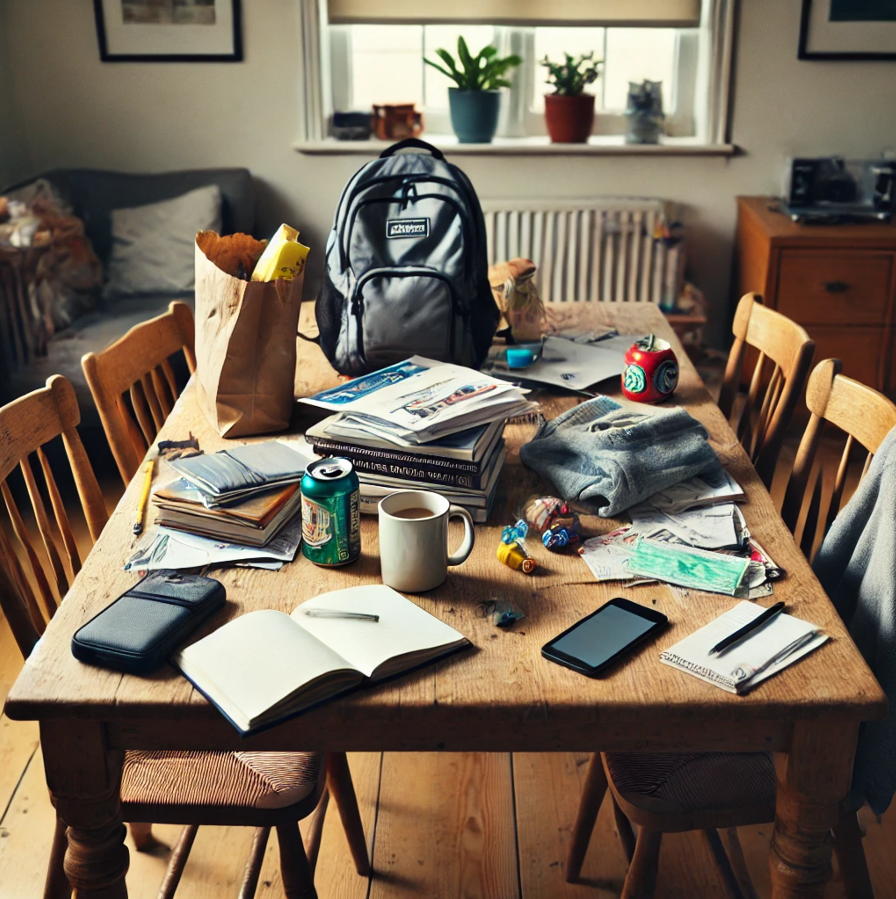Clear the Clutter, Clear Your Mind: How Decluttering Boosts Mental Clarity
- Judy Waldrep

- Dec 10, 2024
- 4 min read
Updated: May 8
We’ve all been there—walking into a messy room and instantly feeling stressed. Clothes on the floor, papers piling up, and that overwhelming sense of “Where do I even start?” Studies show that clutter isn’t just annoying—it directly impacts your mental health. A cluttered space can lead to a cluttered mind, making it harder to focus, think clearly, or even relax.

As someone passionate about mental health, I’ve seen firsthand how decluttering can improve not just your space but your overall well-being. Let’s dive into how clearing the clutter can help clear your mind and give you a fresh start.
The Connection Between Clutter and Mental Health
Clutter is more than just stuff; it’s a reflection of how we feel inside. Studies, like one from UCLA, reveal that living in a cluttered space can spike stress and decrease focus. When your environment is chaotic, it’s harder to relax or feel in control. Your brain works overtime to process the visual noise of clutter, leading to fatigue and frustration. Decluttering removes those distractions, creating a calm atmosphere that fosters mental clarity and emotional balance.
Benefits of Decluttering
Decluttering isn’t just about having a neat home—it’s about improving your life. Here’s what you can gain:
Sharper Focus: Clear Space, Clear Mind
When your space is clutter-free, your brain doesn’t have to process the chaos of scattered items. Visual distractions—like a messy desk or piles of clothes—compete for your attention, making it harder to concentrate. A tidy space allows your mind to focus on what’s important without the mental noise.
Boosted Productivity: Everything in Its Place
Clutter wastes time—it’s that simple. Studies show that the average person spends up to 55 minutes a day looking for misplaced items. By assigning a dedicated spot for everything, you eliminate the daily scavenger hunt.
Mental Relief: Letting Go to Move Forward
Decluttering is more than just tidying up—it’s a form of self-care. Holding onto items that no longer serve you can create emotional baggage, whether it’s a closet full of unworn clothes or a drawer stuffed with unused gadgets. Letting go frees you from the weight of the past and creates room for new opportunities and experiences.
A Sense of Accomplishment
The act of decluttering also gives you a sense of accomplishment. Each drawer you organize or box you donate is a step toward regaining control over your environment and life. This sense of liberation fosters a feeling of peace and helps reduce anxiety, allowing you to fully enjoy your space without the constant reminder of unfinished tasks or cluttered corners.
Decluttering isn’t just about the stuff—it’s about creating an environment that supports your mental clarity, productivity, and emotional well-being.

How to Start: Practical Tips
Not sure where to begin? Here’s how to tackle clutter step by step:
Set a Goal
Decide what you want to accomplish, like organizing your office or reclaiming your bedroom. Be specific about your intentions, such as clearing your desk for better productivity or creating a peaceful, clutter-free bedroom. Use methods like the Four-Box Method (Keep, Donate, Toss, Relocate) to make decisions faster and stay focused throughout the process.
Take It One Area at a Time
Break the job into smaller tasks, like tackling a single drawer, shelf, or corner of a room. This prevents you from feeling overwhelmed and helps you see progress more quickly. Celebrate small wins, such as organizing your kitchen utensils or finally clearing out that junk drawer—it’ll keep you motivated for larger tasks.
Keep What’s Useful or Serves Your Life
When deciding what to keep, ask yourself: “Do I use this regularly? Does it serve a purpose in my life?” If the answer is no, let it go. Focus on items that contribute to your daily routine, bring you joy, or align with your current lifestyle. For sentimental items, consider keeping just a few key pieces to preserve the memory without holding onto unnecessary clutter.
Stick to a Routine
Decluttering shouldn’t be a one-time event—it’s a habit. Schedule regular tidying sessions, like spending 15 minutes each evening or dedicating an hour each weekend to maintaining your space. Create systems that make it easy to put items back where they belong, like labeled bins or designated storage areas, to prevent clutter from building up again.
By following these steps, you’ll create a more organized and functional space while building habits to maintain it long-term.

Clear Your Space, Clear Your Mind
Decluttering isn’t just about tidying up, it’s about resetting your home and nurturing your mental health-decluttering boosts mental clarity. When you create order in your environment, you’re also paving the way for clarity, peace, and personal growth.
Starting small is a great first step, but you don’t have to tackle decluttering alone. The Mess Reset is here to guide you every step of the way, offering personalized support to make the process easier, faster, and more impactful. Let us help you let go of what’s holding you back and create a space that feels calm, balanced, and truly serves your life. Your future self—and your mental health—will thank you. Let’s reset your space together!






Comments